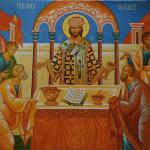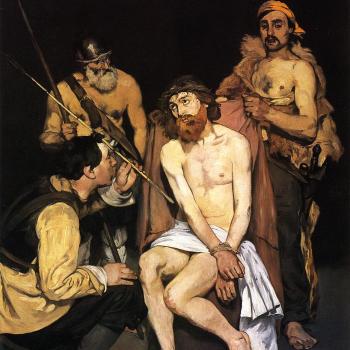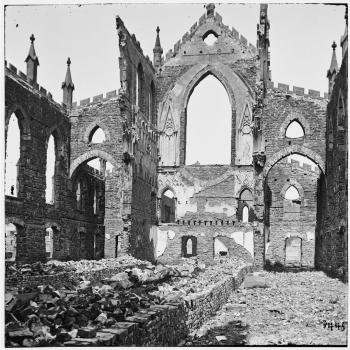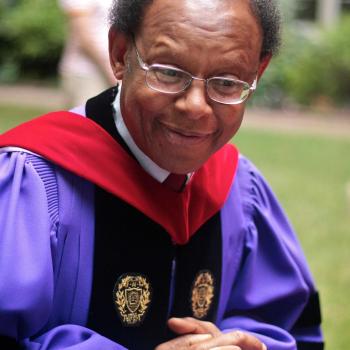
Lumen Gentium says that Church of Christ subsists in the Catholic Church, that is, within the institutional church which was established at the beginning of Christian history. This means there is a distinction between the “Church of Christ” and the “Catholic Church.” They should not be understood as univocal, that is, the “Church of Christ” should not be understood only as the “Catholic Church,” though the Catholic Church should always be seen as participating in and having the Church of Christ within it. In order to make sure that the Church of Christ is not some mere Gnostic church which has no role in history, that is, to make sure that the Church of Christ actually connects to the world at large, it must have a historical form, which is why the institutional church is important. The institutional church preserves the message of Christ, makes sure it connects with and integrates the world with the kingdom of God, and has the direction of the Holy Spirit so that its dogmatic teachings truly present or point to the fullness of the truth. Nonetheless, the distinction between the two is important, for it makes sure the institutional church does not present itself in a false fashion, that is, to make sure the institutional church does not suggest that one must be a member of it in their temporal existence in order to be saved. For, it is clear, the Church of Christ transcends the institution and grace is offered to those who, through no fault of their own, do not enter or remain within the institution. For, without that truth being clearly presented and taught, the institution, which can be and should be a vessel for grace and truth, can become subverted by those within it, having them abuse the good given to it by threatening damnation to those who do not accept their abuse. Those who suffer such abuse and cannot remain with the institution so long as such abuse is there do not have to be seen as lost, nor outside the Church of Christ. The distinction presented at Vatican II can and should be explored and used to understand a great deal of traditional messages about the church by having people examine those messages and determine when they are being said about the Church of Christ and when they are being said merely about the institution, for when this is done, many statements, especially those which discuss the way the Church of Christ is connected to salvation, can be properly understood without leading to some extremist position (like the Feeneyites). It is the kind of distinction which Sergius Bulgakov was hinting at when, decades earlier, he wrote:
Therefore, the Church as a society, an institution, an organization, the “visible” or empirical Church, does not wholly coincide with the Church as Divine-humanity, with its noumenal depth, although the empirical is connected with, based on, and permeated by the Church as Divine-humanity. [1]
The institutional church, the Catholic Church, should not be denied its rightful, indeed, central role in Christian history. Just like we should not think, because institutions often possess some element of corruption within them, that we should have no institutions, so we should also recognize the corruption within the Catholic Church, found throughout history, does not mean the institution itself has no role or value. It needs reform, indeed, it always needs reform, though what reform is needed will differ from age to age. And yet, even when it needs reform, and with it, to do some kind of penance in order to promote that reform, it still has within it the seed of grace, and so it remains a vessel of grace, capable of sharing grace to countless people. The institutional church must not equate this truth with the belief that only it can offer such grace. When it does this, then those who have leadership positions within it, be they bishops, priests, or lay-leaders such as monks, nuns, catechists, apologists, or theologians, begin to think too much of themselves and their authority. Through such presumption, many such authorities assert themselves upon others, abusing them, threatening to take away access of sanctifying and deifying grace from those who do not obey their every whim. The sexual abuse crisis, in part, can be seen as having arisen from this disgraceful attitude, though of course, it would be too simplistic to say it is the only reason why such abuse developed and remained within the institution (for here are many forms of sexual abuse, each with their own particular causes, and so we must not true to generalize them all in a way which ignores some forms of abuse).
When some form of abuse happens, the institutional church should quickly deal with it, pushing back against the abusers instead of defending them while hushing up what happened. The institutional church should listen to what St. Chromatius of Aquileia suggested when he engaged an allegorical reading of Matthew 5:29-30. In his sermons, he said that those who abuse their power and hurt those they are meant to help must be removed from positions of authority, lest they cause many to go astray:
Hence, if this type of eye, that is, bishop, through his depraved faith and disgraceful manner of life becomes a scandal to the church, he commands him to be plucked out, that is, cast out of the body, lest the people be held guilty for his sin. For it is written that “a little leaven corrupts the whole lump” [1 Cor 5:6]. And again, “Remove the evil man from your midst” [1 Cor 5:13]. The hand is understood to signify a priest who, if he holds to a depraved faith or does not lift uprightly, creates a scandal to God’s people. The Lord commands that he be cut off, that is, cast out, lest the church becomes defiled by his sin.[2]
Clergy found to be corrupting the institutional church, when they are not removed, spread their corruption far and wide, leading to all kinds of pain and sorrow for those who remain within it. Yes, it is important that investigators are careful and examine all claims of abuse, such as sexual abuse, without presuming guilt by mere accusation, but on the other hand, they should do so with prudence, showing respect to those who might have been abused, and certainly, not dismiss them without giving a proper investigation into the matter .When credible claims are made an investigation is warranted, the accused should not be left to continue as if everything were normal; rather, they should be given a leave of absence (similar to the way we see other institutions in society deal with those who are credibly accused, such as happens with police officers accused of abuse). The institutional church needs to take the good of the people within seriously instead of serving only itself and its reputation. When those who have suffered such abuse do not see the institutional church engaging such prudence, it is understandable why they will look elsewhere for their spiritual needs; they are blameless and without fault in such situations, because it is the institution’s improper handling of its own affairs which have led them to leave the institution. This is not to say we should take a Donatist understanding of the institution, thinking its failings means it no longer is a vessel of grace; despite whatever failings the institution has, it is guaranteed to be able to offer grace thanks to the work of Christ, not its members. In saying this, it must once again be said, we must not think that such grace is found only in and with the institution, for such a position is not only false, but dangerous, as it is the line of thought which leads to all kinds of abuse. The institutional Catholic Church offers the sacraments, and its dogmas are protected against error, but God is not bound by the sacraments, and certainly, there is also much more to the truth than the conventional teachings presented by the institutional church. When the limits of the institutional church are not recognized, and the institutional church is seen as being univocal with the Church of Christ, abuse will continue, and as abuse continues, many will find it necessary to stand apart from the institution. Others, who do not suffer from it, might find they can and should stay within it, but in doing so, they have a duty to help pressure needful reforms from within, being critical of it and offering what they can to stand in solidarity with those who find themselves on the outside due to such abuse.
As it is, we have seen such abuse has continued for a long time; many who should have known better, have continued to cover up and hide the full reality of it, leading to the point where the institutional church is getting the kind of judgment it needs in order to purify itself. As a consequence of its failings, the church is likely to become a poorer church, which, of course, will put it back on track because it will then begin to serve instead of being served. “For the time has come for judgment to begin with the household of God; and if it begins with us, what will be the end of those who do not obey the gospel of God?” (1 Ptr. 4:17 RSV). It must begin with the institutional church, for it has a higher purpose than any secular institution. It cannot just point to others and say they are also compromised, hoping that it can deflect from itself the judgment it has earned. Certainly, it is important to understand how things developed, how, for example, the sexual abuse crisis developed, and in doing so, see how it connects to a problem which transcends the institutional church as it is found in society as a whole, but that should be done only as a way to understand the root causes of the problem and not to deflect from dealing with the problem itself. Even if it were possible to show some institution in secular society is worse off with sexual abuse than the institutional church, that does not mean the church can just sit back and do nothing and rest in his better state, for the institutional church is meant to be the light of the world (cf Matt. 5:14-6). If the institutional church isn’t the light it should be, it suffers an identity crisis, while secular institutions, because they have a different purpose and value, will not suffer such a crisis from their failures.
The institutional church needs to let the light it has been given to shine. It cannot do that so long as it allows abuse to continue within its domain. It needs to listen to the voices of those who have been hurt, not silence them. It needs to make restitution for the abuses which came from it instead of trying to find a way to ignore its responsibilities. It needs to make for changes, deconstructing bad theological takes which serve as a foundation for such abuse, doing so, carefully so not to undermine the value of the institution but also not to over-emphasize it and make it something which it is not. There are some good things going on, with a few bishops, and the Pope, beginning the process of listening to survivors, letting their voices be heard. But that is not enough. Just as confession requires more than merely stating one’s sins, but a true desire to change and restitution made for the harm which has been caused, the institutional church must listen, confess and undergo the penitential process, humbling itself until, at last, it has been transformed and is capable once again of properly offering the grace and teachings the world so desperately needs.
[1] Sergius Bulgakov, Bride of the Lamb. Trans. Boris Jakim (Grand Rapids, MI: William B. Eerdmans Publishing Company, 2002), 271.
[2] St. Chromatius of Aquileia, Sermons and Tractates on Matthew. Trans. Thomas P. Scheck (New York: Newman Press, 2018), 201-2 [Tractate 23].
Stay in touch! Like A Little Bit of Nothing on Facebook.
If you liked what you read, please consider sharing it with your friends and family!
N.B.: While I read comments to moderate them, I rarely respond to them. If I don’t respond to your comment directly, don’t assume I am unthankful for it. I appreciate it. But I want readers to feel free to ask questions, and hopefully, dialogue with each other. I have shared what I wanted to say, though some responses will get a brief reply by me, or, if I find it interesting and something I can engage fully, as the foundation for another post. I have had many posts inspired or improved upon thanks to my readers.

















